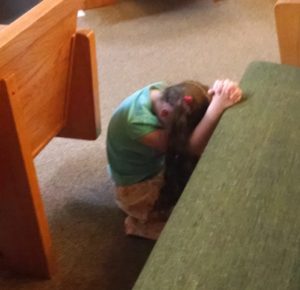
Many times when we pray, it is because we are desperate. We have already tried our plan and have exhausted our ability to reason the problem away with no change in the circumstance. We believe that we are without options or at least without any options we like. We then tend to pray, “God, I am in a desperate situation here. Could You please intervene? Could you please get me out of this uncomfortable circumstance?”
We usually pray these kinds of prayers when we face cancer, bankruptcy, or other catastrophic events. However, no one blames you if you pray like this after a hard day with toddlers. If you have prayed something like this, you are not alone, and you are not the first person to have prayed that type of prayer.
Sometimes when we have these types of conversations with God, we are out of ideas or options of how to deal with the problem. Other times it is because we do not like any of the options available to us, and we would like God to create a more comfortable option for us to use to escape the situation.
I have enjoyed woodworking since my teenage years. Much of my work as a woodworker is repair work to antique furniture. There have been times when I have been working on a project and have run out of ideas about how to resolve a problem I am facing.

I recall one day when I was working on a project and was mystified by how to solve the difficulty I was facing. I stopped and prayed. I said, “Jesus, I don’t know what to do to fix this problem. You were in a carpenter’s shop when you were growing up. What would you suggest I do to be able to complete this project?” Within just a few minutes, a previously unthought-of method popped into my head, enabling me to complete it. I had exhausted my options and asked God to make an option. I have found it helps me to pray as though Jesus is standing right there.
In the book of 2 Kings, I read about a king of Judah named Hezekiah. While he was king, the army of another country tried to conquer the land of Judah. This foreign army sent threats to Hezekiah and tried to influence him to surrender. They even sent a threatening letter to King Hezekiah. It was a challenging time. The choice seemed to be, would Hezekiah surrender and allow all his people to become slaves to a foreign power, or would he try to fight against an army that was vastly larger than his army? Hezekiah prayed a prayer of desperation. (You can read his actual prayer in 2 Kings 19:15-19) God’s answer to that prayer was a third option that was beyond Hezekiah’s ability to produce. The opposing army suffered defeat without Judah’s military, even going into battle, and the king of the foreign army went home. When the foreign king arrived home, his sons assassinated him. You can read the details in 2 Kings 19:20-37.
I recognize that most of us are not facing a foreign army, but we all face times when it seems like there are no acceptable options. There are times when I find myself praying, “God, I need a win today. I have had so many areas where the situations are challenging lately, and I am starting to lose hope that things will get better. Please help me to get something completed successfully today.”

Sometimes my desperate prayers are a little more self-serving. “God, please help me to complete my to-do list today even though it has two days worth of work on it! You see how hard I am trying and how much I need to get these projects done.”
Thankfully I am not the first to pray a prayer that some would view as somewhat selfish. King Hezekiah prayed for God to extend his life. (2Kings 20:2-3) He reminded God of all the good he had done and of how he had dedicated his life to following God.
God knows the attitude of our hearts when we have desperate conversations with Him. God answered King Hezekiah’s prayer and granted him an additional fifteen years.
I am guilty of making one-day to-do lists that really should be two day’s work. I am amazed by how much I have accomplished after a prayer for help with my oversized to-do list. I believe that the answer to why God answers some of these prayers of desperation, that onlookers would call selfish, is found in the words of Jesus. “If you, then, though you are evil, know how to give good gifts to your children, how much more will your Father in heaven give good gifts to those who ask him!” Matthew 7:11 (NIV) God likes to give good gifts.
God understands desperate prayers. He comprehends the reason for the prayer and the situation, causing us to pray with desperation. Desperate prayers show our true feelings, motivations, and the fact that we realize we do not have the answers in ourselves. We recognize that we are not all-powerful and need help when we have these desperate conversations with God. When we do not have the solutions to the problems we are facing, we express our true beliefs about God.

Desperate prayers express faith that God has help for us in our times of hopelessness. It seems that many times, these conversations that we have with God when we are in a difficult place, help us to remember our need for Almighty God. Perhaps the situations that bring about the prayers are designed to remind us of our need to live in God’s shadow. When we do not face hard times, we tend to forget that we do not control every aspect of life. It is when we face hard problems that we remember our need for the Creator of the universe.
Living in God’s shadow places us in His care during both the good and the bad times. It enables us to live confident of His assistance, whether life is easy or hard.










